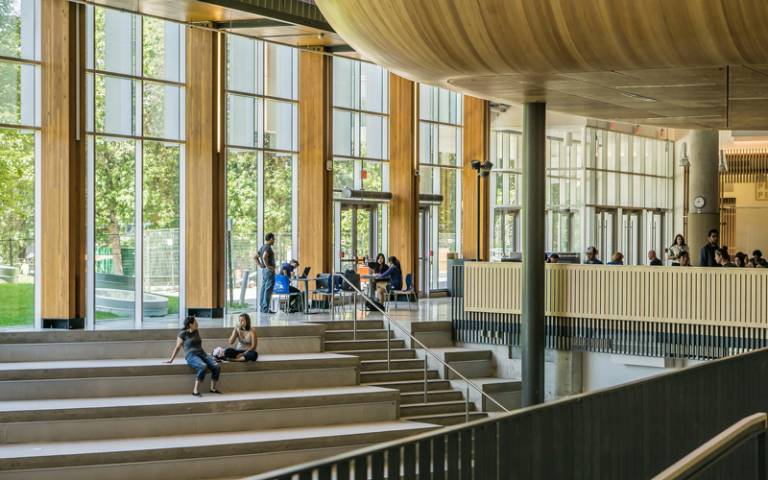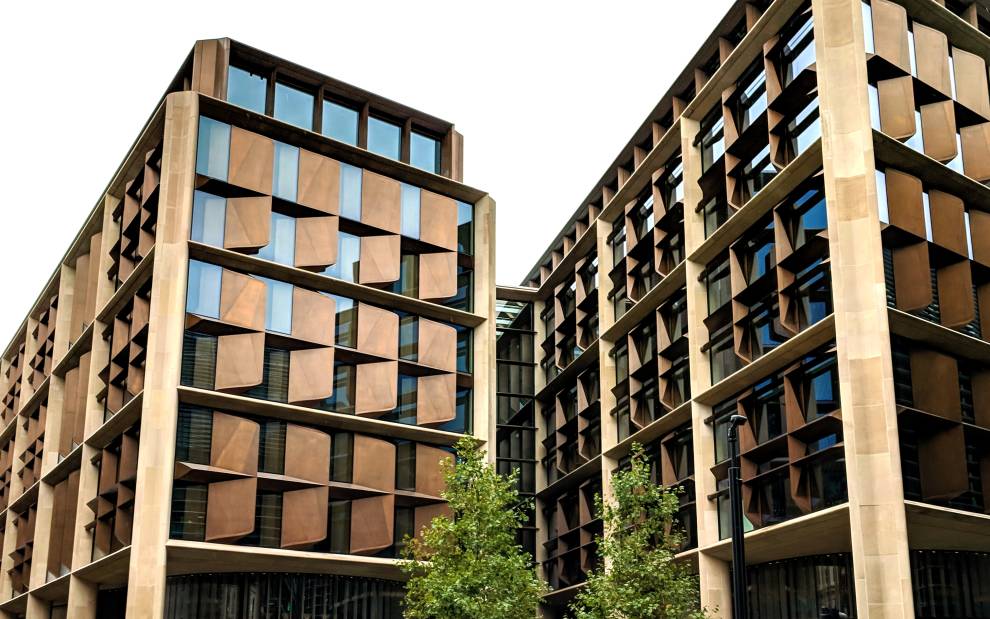Moisture, temperature and air quality

Buildings are complex, dynamic, socio-technical systems seeking to provide solutions to a multitude of sometimes ill-defined and conflicting design issues. Through our research, we aim to improve the design, operation and environmental quality of buildings. We do this by providing timely, impartial information on design techniques and building technologies as well as developing novel engineering tools to help industry deliver truly sustainable buildings.
Our researchers are pioneering the development of integrated multi-variable built environment data frameworks. Our building and building stock performance modelling and analysis involves developing a digital model that usefully represents a complex system. We use these digital models to predict, assess and analyse the dynamic and complex interactions that influence environmental performance. This informs policy-makers and supports the decision-making process for building design and operation. Finally, temperature, air quality and hygrothermal measuring, monitoring and testing research involves environmental chambers, extensive field environmental monitoring, detailed building and social surveys, and interventions in people’s homes and workplaces.
Jump to: Research areas | Recent Projects | In teaching | Researchers
Research areas
Building performance analysis

Overheating in buildings

Winter cold and fuel poverty

Given the recent energy crisis and the rise in fuel bills, many households are facing fuel poverty. This can result in a multitude of physical and mental health problems. Our research investigates the impact of mitigation measures such as home energy efficiency retrofit and fuel subsidies on population health outcomes. We aim to inform policy in order to reduce health inequalities caused by fuel poverty and winter cold.
Moisture in buildings

Indoor air quality

Recent projects
Our research projects reflects our research themes of temperature and health, climate change and wellbeing, climate modelling, urban meteorology, geospatial analysis of urban health risk and urban heat mitigation. Some examples of our projects are:
Moisture, temperature and air quality in teaching
Our teaching in this area focuses on establishing a sound understanding of moisture, temperature and indoor air quality risks in buildings. We aim to introduce future designers and practitioners to the methods, practice and consequences of poor indoor environmental quality and how to alleviate these issues.
Health, Wellbeing and Sustainable Buildings MSc

Moisture, Temperature & Air Quality are key determinants of health and wellbeing in the built environment and students are taught what causes these issues and how to mitigate against them. Climate change and the interaction with health and wellbeing is key in this MSc - students learn how buildings can be designed using a more holistic, human-centred approach with health and wellbeing a key priority. The dissertations completed in the programme span a variety of areas focused on healthy indoor environments often in response to threats such as climate change.
Relevant modules:
- Health, Comfort and Wellbeing in the Built Environment
- Wellbeing in Buildings: Theory and Practice
- Integrated Building Design for Health and Wellbeing
- Methods of Environmental Analysis
- Health and Wellbeing in Cities: Theory and Practice
- Indoor Air Quality in Buildings
Examples of past dissertation titles:
- 'Impacts of roofs designed to cool on indoor temperature in warm and cold seasons'
- 'Reducing urban overheating in different global cities'
- 'Indoor air quality and climate change resilience in UK low carbon schools'
Environmental Design and Engineering MSc

Moisture, Temperature & Air Quality are key considerations when designing buildings and our teaching helps students understand and mitigate against these issues. Environmental issues and urban sustainability are at the core of this programme and students learn how the built environment can be designed to both mitigate and adapt to the risks posed by climate change.
Relevant modules:
- Health, Comfort and Wellbeing in the Built Environment
- Building solar design
- Natural and Mechanical Ventilation of Buildings
- Methods of Environmental Analysis
- Efficient Building Service Systems
- Post Occupancy Evaluation of Buildings
- Indoor Air Quality in Buildings
Examples of past dissertation titles:
- 'Indoor air quality in Central London Offices'
- 'The accuracy and use of CO2 monitors in buildings'
- 'Evaluation of Passivhaus design strategy in a changing Climate for different kind of rooms'
Doctoral Research (PhD)
Moisture, Temperature and Air Quality is a key issue address in several PhD research topics and we welcome MPhil/PhD candidates looking to undertake their own original research relating to the Moisture, Temperature and Air Quality MSc under the supervision of our research staff. Below are some examples of the current MPhil/PhD theses’ being pursued in the programme. If you are interested in starting a PhD with us please visit the Environmental Design and Engineering MPhil/PhD page to find out more about the application process.
Doctoral research relating to Moisture, Temperature & Air Quality
- Jalal Ahmed: Scalable method to assess ventilation rates in dwellings
- Minnie Ashdown: A novel method for the empirical characterisation of air exchange rates in naturally ventilated buildings, based on results from measure theory and a Stochastic Differential Equation interpretation of ambient CO2 time series.
- Toby Cambray: Hydrophobic treatments, heritage masonry and IWI: reducing moisture risks?
- Cheng Cui: Future Heat Resilience in Dwelling Retrofit: A Probability-based Optimisation Approach
- Ruiwen Deng: To what extent temperature affects human sleep in UK residential homes
- Alex Fung: Timeless Digital Twins for the Energy Health Nexus
- Amr Hamada: Retrofit Strategies for Public Administrative Buildings in Egypt
- Giorgos Petrou: Development of a Bayesian calibration framework for archetype-based housing stock models of summer indoor temperature
- Athina Petsou: Rethinking retrofit: putting users in the centre in order to reduce energy and unintended consequences
- Zeyu Zhao: The Impact of Exposure to Indoor Volatile Organic Compounds (VOCs) on Human Cognitive Performance
- Jiaxu Zhou: Effects of Short-term Exposure to Indoor PM2.5 on Cognitive Performance in Working Age Adults and Implications for Office Buildings
Researchers
Hector Altamirano
Associate Professor
h.altamirano-medina@ucl.ac.uk
Dejan Mumovic
Professor
d.mmumovoic@ucl.ac.uk
Minnie Ashdown
Associate Professor
minnie.ashdown@ucl.ac.uk
Giorgos Petrou
Research Fellow
giorgos.petrou@ucl.ac.uk
Esfandiar Burman
Associate Professor
esfand.burman@ucl.ac.uk
Rokia Raslan
Associate Professor
r.raslan@ucl.ac.uk
Oscar Brousse
Research Fellow
o.brousse@ucl.ac.uk
Samuel Stamp
Teaching Fellow
samuel.stamp@ucl.ac.uk
Elizabeth Cooper
Lecturer (Teaching)
elizabeth.l.cooper@ucl.ac.uk
Phil Symonds
Lecturer
p.symonds@ucl.ac.uk
Duncan Grassie
PhD Student
duncan.grassie.16@ucl.ac.uk
Ioanna Tsoulou
Research Fellow
i.tsoulou@ucl.ac.uk
Dashamir Marini
Teaching Fellow
d.marini@ucl.ac.uk
Marcella Ucci
Associate Professor
m.ucci@ucl.ac.uk
Anna Mavrogianni
Professor
a.mavrogianni@ucl.ac.uk
Yan Wang
Research Fellow
y.wang@ucl.ac.uk
Bingyu Xu
Research Fellow
bingyu.xu.20@ucl.ac.uk
 Close
Close

